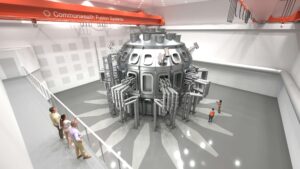Energy legislation unveiled by House Republicans last week in response to the Waxman-Markey climate change and energy bill focuses heavily on an expansion of the nation’s nuclear industry, calling for construction of up to 100 new nuclear power plants by 2030 to meet the nation’s energy needs and environmental challenges.
In introducing American Energy Act, Rep. Mike Pence (R-Ind.)—also chair of the House Republican Conference—called the legislation an “ ‘all of the above plan’ that offers energy independence, more jobs and a cleaner environment without imposing a national energy act.”
“The Democrat answer you just heard is a national energy tax that will lead to higher energy prices and massive job losses for the American people. The President said it best a year ago when he said if the cap and trade plan were to pass, utility rates would ‘necessarily skyrocket.’ Some estimates suggest job losses between 1.8 million and 7 million,” he said. “Well, Republicans have a better plan: The American Energy Act.”
The plan would set up a National Policy Goal that would push for—without mandating—construction of 100 new nuclear reactors by 2030. The GOP advocates a “fast track” of the regulatory process with the establishment of an accelerated regulatory process for new reactor applicants. Under the two-year program, applicants would have a full and complete combined construction and operation license application, demonstrate financial commitment to long-lead components, and the reactor proposed must be a design already certified by the Nuclear Regulatory Commission (NRC).
This measure was applauded by the Nuclear Energy Institute. Though it called the target of 100 new nuclear plants by 2030 “ambitious,” it said, “There are scenarios in which it is possible for industry to have that many plants in operation, under construction or in the licensing process within the next two decades. According to the Environmental Protection Agency’s analysis of the Waxman-Markey energy and climate change bill, 180 new reactors are needed by 2050 to meet the carbon reductions required by the proposed legislation.”
The GOP bill also partly addresses supply and waste management issues. The plan would create a “uranium supply-disruption mitigation reserve” whereby the Department of Energy (DOE) would audit all unused materials in its system that could be used to power commercial reactors. Some portion of this uranium would be allocated to be a temporary reserve of reactor fuel to protect against a “foreign supplier attempt to deny” American energy producers access to uranium fuel.
The plan would “prohibit” the Obama administration from withdrawing the DOE’s Yucca Mountain application, which is being reviewed by the NRC. It would also repeal the now-defunct nuclear waste repository’s 70,000-metric ton limitation, “letting science and technology dictate how much the repository can safely hold.” Additionally, it would direct the Interior Department to grant all necessary rights of way and land use permissions for spent fuel storage facilities if the state and locality were to reach an agreement with a private entity.
Regarding spent fuel recycling, it would require the energy secretary to use amounts in the Nuclear Waste Fund to enter into long-term contracts with private sector entities for the recycling of spent fuel and, ultimately, it “prohibits administrations from blocking or hindering” recycling spent nuclear fuel.
The bill promotes alternative energy technologies: It makes permanent tax credits for the production of renewable electricity. It would also make permanent investment tax credits for solar energy and for fuel cell properties and extend the biodiesel and renewable diesel tax credits.
It also contains a section that seeks to cut “red tape” and reduce “frivolous lawsuits” by curtailing lawsuits that “obstruct” energy exploration. In an attempt to spur research and development, it also proposes offering a $500 million prize to the first U.S. auto maker to sell 50,000 economically feasible vehicles that get 100 mpg.
Source: GOP










